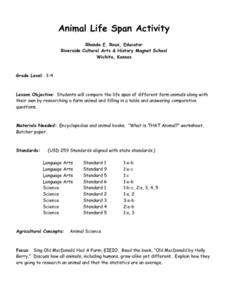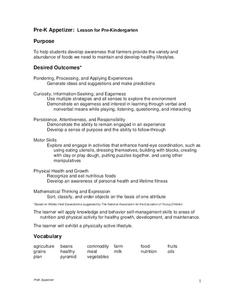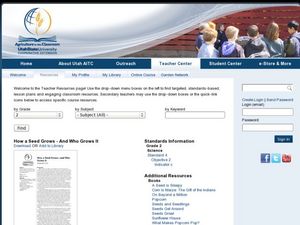Curated OER
It All Starts With a Seed
Students use laboratory equipment safely. They identify structures in a seed. They distinguish between monocots and dicots. They search for information using the computer.
Curated OER
Seed to Market
Students research using a variety of materials and technology. They explain the specifics of growing crops. They use mathematics in common business calculations.
Curated OER
Animal Life Span Activity
Students study and compare the life span of farm animals with their own. They research a farm animal, complete a table and answer comparative questions. They work in jigsaw format groups.
Curated OER
Impact of the End of World War II on Japan
Ninth graders examine and discuss reasons United States occupied Japan after surrender in World War II, view photographs of Japan at end of War and explore how U.S. occupation affected Japan's political, economic, and social systems, and...
Curated OER
GPS Art
Students design their own logo or picture and use a handheld GPS receiver to map it out. They write out a word or graphic on a field or playground, walk the path, and log GPS data. The results display their "art" on their GPS receiver...
Curated OER
Selecting a State Fish
Students work in groups to select a state fish for their state. They review reference materials to make a list of state characteristics and select a fish that best exemplifies the state.
Curated OER
Greek Theatre Styles
Seventh graders are introduced to the different styles of Greek theatres. As a class they discuss the level of sophistication in different areas and the purpose of the theater. To end the lesson, they practice the techniques of the...
Curated OER
What Can You Do?
Students explore reasons for the destruction of the wetlands and identify ways people can help protect them. They create and design a wetlands conservation poster to be presented to the class.
Curated OER
What is in Soil?
Fourth graders identify and examine the components that make up soil. Individually, they use a magnifying glass to identify the organic and inorganic material in their soil sample. To end the lesson, they record the differences in the...
Curated OER
Imaginative Minds
Eighth graders study the lives and creations of several significant inventors as well as designing their own invention and submitting it to a mock patent process. They determine the importance of notable inventions and their impact on...
Curated OER
Civilization Pie
Learners define civilization as it was in ancient times. In this world history lesson, students work in small groups to write a recipe that has all the combined ingredients of early civilized societies and share their results with...
Curated OER
Pre-K Appetizer
Students understand there are healthy and not healthy food choices. In this food pyramid lesson, students learn to make healthy choices by playing a traffic light game. Students recognize raw foods from the farm may not be ready for...
Curated OER
Exploring the USA and the World with Cartograms
Students investigate cartograms in order to explore the different countries on Earth. In this world geography lesson, students use the Internet to analyze data on different cartograms. Students compare data, such as population density,...
Curated OER
Eat Smart, Play Hard
Students discover why breakfast is important. In this nutrition lesson, students read a "Power Up With Breakfast" worksheet and discuss the importance of breakfast. Students draw pictures of fruit they would want in their breakfast shake.
Curated OER
What's a Swamp Good For?
Students identify the function and value of wetlands. In this activity on appreciating wetlands, students explain how different household items can represent different aspects of the wetlands.
Curated OER
Veggie Quesadilla Recipe: Possessive Nouns
Students identify nouns and pair them with a possessive noun. In this possessive noun lesson, students read a recipe and identify the nouns. Then, students pair each noun with a possessive noun and use them in a sentence.
Curated OER
Archaeological Study
Students analyze the difference between archaeology and anthropology while studying the evolution of different products. In this archaeology and anthropology instructional activity, students trace the progression of a certain tool or...
Curated OER
There's a Watershed in my Backyard!
Students explain what the term watershed is by creating a model. In this science, geography instructional activity, students demonstrate how the water moves in a watershed. Additionally, students learn about point source and nonpoint...
Curated OER
Exploration Watershed
Students discuss what a watershed is, and locate watersheds on a map. In this watershed lesson, students use the information they have been introduced to and create a color coded watershed map of their own.
Curated OER
Be a Watershed - Create a Living River
Students investigate water ways by conducting an experiment with classmates. In this natural resources lesson, students define a watershed and identify where large ones are located within the United States. Students utilize...
Curated OER
Piece Like a River
Students investigate water formations by creating a puzzle. In this water properties lesson, students create a giant river puzzle by drawing on large butcher paper as a class, then dividing the image up into many pieces. ...
Curated OER
Weight Control
Students study the importance of a healthy diet. In this weight control instructional activity students divide into groups and develop a healthy lunch menu.
Curated OER
How a Seed Grows: And Who Grows It
Second graders explore botany by viewing video clips in class. In this seed growth lesson plan, 2nd graders identify the types of seeds that grow specific plants and what the optimal conditions are for growing seeds. Students view a...
Curated OER
Barter Day
Fifth graders research bartering. In this bartering instructional activity, 5th graders investigate bartering as a way to trade for goods and services. Students experience bartering first hand while playing a game.























